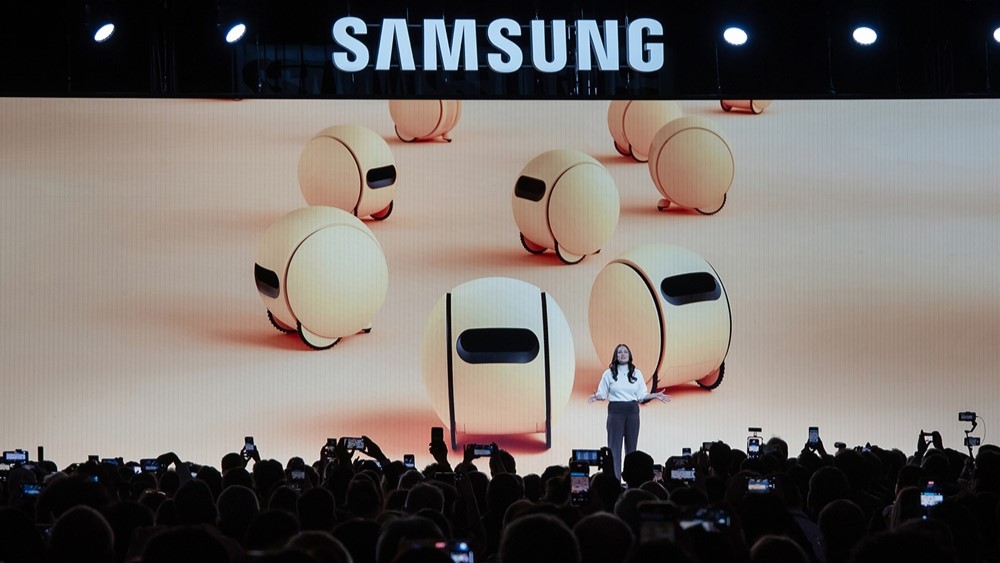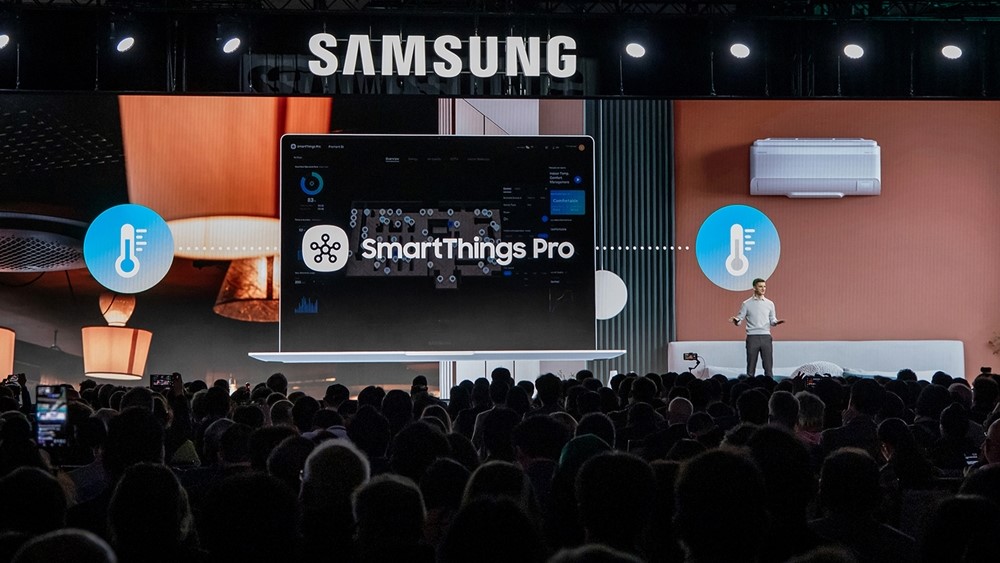개인 맞춤형 경험을 제공할 수 있는 에이전틱 AI가 새해 시작을 장식하면서 홈 IoT는 홈 AI로 진화하고 있다. 스마트홈과 퍼스널 AI 시장이 올 한 해 주요 화두가 될 것으로 기대되는 가운데 CES 2025에서 삼성이 홈 AI(Home AI) 비전을 공개하면서 LG와의 시장 경쟁이 치열해질 것으로 전망된다.
▲한종희 삼성전자 부회장 / (사진:삼성전자)
삼성 CES 첫머리 ‘AI 보안’ 강조..사용자 거부감 해소 必
환경 센싱 통한 공간 AI 구현...비전 AI에 식품 구매 연동
‘스마트싱스 프로’ B2B 시장 확대, 삼성중공업·현대차 협업
개인 맞춤형 경험을 제공할 수 있는 에이전틱 AI가 새해 시작을 장식하면서 홈 IoT는 홈 AI로 진화하고 있다. 스마트홈과 퍼스널 AI 시장이 올 한 해 주요 화두가 될 것으로 기대되는 가운데 CES 2025에서 삼성이 홈 AI(Home AI) 비전을 공개하면서 LG와의 시장 경쟁이 치열해질 것으로 전망된다.
삼성전자가 현지시각으로 지난 6일 미국 라스베이거스에서 CES 2025 삼성 프레스 콘퍼런스를 열어 전세계에 삼성의 초개인화 맞춤형 ‘홈 AI(Home AI)’ 비전을 공개했다.
한종희 삼성전자 부회장은 “삼성전자의 홈 AI는 사용자에 대한 이해를 바탕으로 초개인화된 맞춤형 경험을 제공한다”면서, “340여개 스마트씽스 파트너들과 함께 홈 AI를 통한 변화를 보여줄 때이다”라고 언급했다.
홈 AI를 전면에 내세운 삼성이 발표의 첫머리로 강조하는 것은 ‘보안’이었다. 개인화된 AI에서 해소해야 할 장벽은 ‘개인정보보호’와 ‘사용자 거부감 해소’에 있다. 민감한 개인정보들에 대한 데이터 수집이 일상적으로 이뤄질 수밖에 없는 AI 서비스에서 보안은 생명이나 다름없다. 자칫 AI 서비스에서 유출사고라도 발생한다면 시장이 꽃 피기도 전에 질 수 있는 것이기 때문이다.
삼성이 CES 2025 발표 첫머리에 모바일 기기와 TV 가전 등 하드웨어에서 민감 데이터 보호를 위한 ‘삼성 녹스(Knox)’를 강조한 이유도 이러한 고려가 반영된 것으로 풀이된다. 삼성은 개인 데이터를 보호하는 녹스 매트릭스를 모바일을 비롯해 TV 가전 등 와이파이가 탑재된 제품 전 영역으로 확대한다고 밝혔다.
더불어 PIN·비밀번호·생체정보 등 사용자의 민감 정보를 별도 보안 칩에 저장해 더욱 강력하게 보호하는 ‘삼성 녹스 볼트’도 패밀리허브 신제품 등 일부 가전으로 확대된다.

▲삼성은 스마트 비서로 활용 가능한 가정용 로봇 ‘발리’를 상반기에 출시할 예정이라고 밝혔다.
/ (사진:삼성전자)
공감 AI라는 키워드로 CES를 공략한 LG와 달리 삼성은 ‘공간 AI(Spatial AI)’를 부각시키며 스마트싱스 앰비언트 센싱(Ambient Sensing) 기술을 소개했다. 이를 통해 연결된 기기들은 움직임과 주변 소리까지 감지·분석해 상황에 맞춰 집안 정보 요약, 조치가 필요한 상황 알림, 기기 제어 제안 등을 하는 기능을 제공한다.
또한 AI 음성 비서 빅스비를 통해 사용성을 확대할 예정이다. 가족 구성원의 목소리를 구별해 개개인별 맞춤형 솔루션을 제공하는 것이 핵심이다. 이는 AI 에이전트 서비스를 개발하는 가전·스마트 IoT 기업들의 공통된 개발 방향이기도 하다.
삼성전자는 갤럭시 AI와 마이크로소프트의 코파일럿+ PC 기능을 동시 탑재해 갤럭시 북5 Pro와 북360에 강화된 AI 기능을 강조했다. △화면 속 이미지나 텍스트를 쉽고 빠르게 검색할 수 있는 ‘AI 셀렉트’ △오래되거나 화질이 낮은 사진을 선명하게 보정하는 ‘사진 리마스터’ 등의 기능을 소개했다.
이외에도 △삼성 헬스케어 △삼성 비전 AI 적용 TV 신제품 △터치형 스크린을 탑재한 스크린 가전 신제품 등을 선보였으며, 미국 온라인 식료품 배송업체 ‘인스타카트(Instacart)’와 협업해 냉장고에 탑재된 스크린을 통해 부족한 식재료를 즉시 구매할 수 있는 서비스를 2025년 내 미국 시장에 도입하는 등 가전 플랫폼의 확장성을 제시했다.

▲산업용 삼성 스마트싱스 프로
/ (사진:삼성전자)
스마트싱스는 가전과 IoT 플랫폼 밖에서도 활약할 준비를 마쳤다. 삼성전자는 가정을 넘어 산업 전반에서도 적용하는 ‘스마트싱스 프로’를 통해 B2B 진출을 확대하고 있다. △삼성중공업 △현대차그룹과 협업한 사례를 선보였다.
삼성중공업은 스마트싱스를 선박에 적용해 △선박 운영 시스템 확인·관리 △에너지 통합 관리 △비정상 활동 지속 모니터링 등 선박 내 환경 관리를 향상시켰다. 현대차는 차량용 스마트싱스를 선보이며 △차량의 위치를 찾는 ‘스마트싱스 파인드’ △차량 탑승 전 스마트싱스를 통해 차량 상태 확인·원격 제어 △차량 인포테인먼트 시스템을 통한 집안의 가전기기 원격 제어 △가정용 카메라의 모션 감지 알림 확인·실시간 영상 확인 등의 기능을 제공한다.
삼성전자 자회사 하만에서는 운전자가 도로에 집중할 수 있도록 돕는 ‘레디 케어 솔루션’과 ‘레디 비전’ 제품에 이어 운전자가 차량과 보다 친근하게 소통할 수 있도록 돕는 차량 내 아바타 ‘레디 인게이지’를 새롭게 선보였다.
한편, LG전자는 ‘공감지능’을 통한 AI 홈·공간 생태계 조성에 박차를 가하며 미래 비전을 드러냈다. 모빌리티와 가전에서 AI를 구현하기 위해 ThinQ 플랫폼에 애플리케이션 확장을 도모하는 개방형 생태계를 구축하고 있다. 이에 삼성전자와의 스마트홈 분야 AI 전쟁이 확대될 것으로 예상된다.
.jpg)

